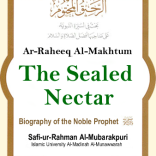Beat Your Wives ? – One of the Biggest Misconception about Islam !
Posted by: KING-slave of ALLAH ! on: April 17, 2011
- In: All | Allah الله | HOAX-Messages | Islam | Islam News | MC-Islam | MC-Quran | MC-Women | Miracles of Allah | Miss-Conception | Prophet Muhammad [pbuh] | Prophets | Women In Islam
- 1 Comment
Beat Your Wifes ? – Remove your Misconception !
Why the Quran tells men to “beat them” meaning their wives? (chapter 4, verse 34)

Transliteration
Alrrijalu qawwamoona AAala alnnisa-i bima faddala Allahu baAAdahum AAala baAAdin wabima anfaqoo min amwalihim faalssalihatu qanitatun hafithatun lilghaybi bima hafitha Allahu waallatee takhafoona nushoozahunna faAAithoohunna waohjuroohunna fee almadajiAAi waidriboohunna fa-in ataAAnakum fala tabghoo AAalayhinna sabeelan inna Allaha kana AAaliyyan kabeeran
Meaning of the Words
For the three words fa’izu, wahjaru, and wadribu in the original, translated here ‘speak to them in a persuasive manner’, ‘leave them alone (in bed – fi’l-madage‘),’ and ‘have intercourse’, respectively, see Raghib Lisan al-’Arab and Zamakhsari. Raghib in his Al-Mufridat fi Gharib al-Qur’an gives the meanings of these words with special reference to this verse. Fa-’izu, he says, means to ‘to talk to them so persuasively as to melt their hearts.’
(See also v.63 of this Surah where it has been used in a similar sense.)
Hajara – Wahjaru (do not touch or moleste them)
Hajara, he says, means to separate body from body, and points out that the expression wahjaru hunna metaphorically means to refrain from touching or molesting them. Zamakhshari is more explicit in his Kshshaf when he says, ‘do not get inside their blankets.’
Here is the translation of meaning of the verse as best can be defined according to the rules of understanding Quran with the explanations following this translation:
“Men are the protectors and maintainers of women, because Allah has made one of them to excel the other, and because they spend (to support them) from their means. Therefore the righteous women are devoutly obedient (to Allah), and guard in the husband’s absence what Allah orders them to guard (e.g. their chastity, their husband’s property, etc.). Regarding women guilty of lewd, or indecent behavior, admonish her (if she continues in this indecency then), stop sharing her bed (if she still continues doing this lewd behavior, then), [set forth for her the clear meaning of either straighten up or else we are finished and when she returns to proper behavior take up sharing the bed with her again], but if she returns in obedience (to proper behavior and conduct) then seek not against them means (of annoyance). Surely, Allah is Ever Most High, Most Great.”
Let me begin by explaining the English language is not powerful enough when it comes to translating the meanings of the Arabic of the Quran. Nor for that matter, is any other language on earth. So, all we have is translations of meanings according to the best understanding of the translators.
The operative word in this verse in Arabic is “daraba.” While there are literally hundreds of uses for this word varying from “tap” to “walk in stride” to “strike at something” to “set a clear example”, the only meaning that can be assigned to something in the Quran must be according to the rules of Quran. And Allah has used the same word a number of times with a consistent meaning. Let us examine them. Here is what we find from the scholars of the Arabic language:
Daraba (to have intercourse, not to beat)
Raghib points out that daraba metaphorically means to have intercourse, and quotes the expression darab al-fahl an-naqah, ‘the stud camelcovered the she-camel,’ which is also quoted by Lisan al-’Arab. It cannot be taken here to mean ‘to strike them (women).’ This view is strengthened by the Prophet’s authentic hadith found in a number of authorities, including Bukhari and Muslim: “Could any of you beat your wife as he would a slave, and then lie with her in the evening?” There are other traditions in Abu Da’ud, Nasa’i, Ibn Majah, Ahmad bin Hanbal and others, to the effect that he forbade the beating of any woman, saying: “Never beat God’s handmaidens.”
Source: al-Qur’an: a contemporary translation by Ahmed Ali, Princeton University Press, 1988; pp78-79
Daraba (to set forth, to make a clear statement or proclamation)
One of the key rules of understanding words of the Quran is to go to other places in the Quran to investigate the usage in other places. This word is used by Allah in other places in the Quran to mean “set forth” or “sets up for you” or “makes known to you” – as is demonstrated in the following verses:
Surah Ar-Ra’d (13:17) yadribu Allahu al-amthala “Thus Allah sets forth a parable”
[here the word “yadirbu” is from the exact same root da-ra-ba]Surah Ibrahim (14:24): Alam tara kayfa daraba Allahu mathalan .. “Don’t you see how Allah sets forth a parable?..”
And again in the next verse: Surah Ibrahim (14:25) wa yadribu Allahu al-amthala li-naasi“..and Allah sets forth parables for mankind..” [again the word yadirbu is from da-ra-ba]
Surah An-Nur (24:35) wa yadribu Allahu al0amthala lin-naasi
“And Allah sets forth parables for mankind..”
Surah Ar-Rum (30:28) Daraba lakum mathalan min anfusikum “He sets forth for you a parable from yourselves..”
Surah At-Tahreem (66:10) Daraba Allahu mathalan lillatheena kafaroo.. “Allah sets forth an example for those disbelievers..”
In fact, the word daraba has not been translated to mean (beat) or (hit) or (strike) in any other verse of the Quran except this one.
The words for (beat) as in [to hit] found in Surah Baqarah 2:275 … kama yaqoomu allathee yatakhabbatuhu ash-shaytanu mina almassi..
“..like the standing of someone beaten by the devil (Satan) leading him to insanity.“
And in Surah Ta Ha 20:18 Allah Says, “Qala hiya Aasaya atawakkao Aalayha waahushshu biha Aala ghanamee waliya feeha maaribu okhra.”
“This is my stick, whereon I lean, and wherewith I beat down branches for my sheep and wherein I find other uses.”
As you can see, these are not even related to the word (daraba).
Verses 34 and 35 in Surah An-Nisaa’ need to be read together to understand this is the proper relationship between men and women in general and husband and wife specifically.
Islam seeks to hold the family together and to make peace and reconciliation between spouses. The next verse makes it clear what to do in the case where it seems that divorce may be the result of the uncorrected bad behavior. It stresses appointing arbitrators from both sides and seeks reconciliation.
The first part of 34 deals with all men taking care of all women. Then goes on to explain the wife’s proper obedience to Allah because He is the One Who has ordained this relationship of provision and protection for her and to be appreciative and respectful of her husband, guarding herself and his property in his absence. The man is told the proper way to behave when he finds his wife not complying with decency and proper behavior of a Muslim wife. He has a direct order to begin with admonishing her and then if there is compliance to leave her be and don’t give her a hard time about it. However, if this continues, he should not have sex with her and this makes it clear to her that he is most serious and this not a joke. Again, if she comes around then he is to let it go and not bother her about it. Finally, if she still insists on such lewdness and bad conduct, he is to make it clear to her in no uncertain terms that they are going to be heading for separation or even divorce unless she comes back to proper behavior. Again, if she complies, then he should not bring it up and return to the bed with her.
And of course, this is all in an effort to translate one short but powerful phrase from Arabic to English. The sources are quoted herein and there may be other interpretations but the only acceptable ones are those based on the teachings of the Quran and the prophet, peace be upon him.
And as always, Allahu ‘Alim (Allah is the Knower)
Source: al-Qur’an: a contemporary translation by Ahmed Ali, Princeton University Press, 1988; pp78-79
In the past, some translators of this verse have mistakeningly used the word “beat” or “hit” or even “scourge” (as in the case of an old translation) to represent the word “daraba” in Arabic. This is not the opinion of all scholars especially Raghib and Zamakhshari as mentioned above and those who are well grounded in both Islam understanding and the English language.
Men are the protectors and maintainers of women, because Allâh has made one of them to excel the other, and because they spend (to support them) from their means. Therefore the righteous women are devoutly obedient (to Allâh and to their husbands), and guard in the husband’s absence what Allâh orders them to guard (e.g. their chastity, their husband’s property, etc.). As to those women on whose part you see ill conduct, admonish them (first), (next), refuse to share their beds, (and last) beat them (lightly, if it is useful), but if they return to obedience, seek not against them means (of annoyance). Surely, Allâh is Ever Most High, Most Great.
The understanding now is that some of the translations are not properly representing the spirit of the meaning. Therefore, they cannot be considered to be the representation of what has been intended by Almighty God.
Now we can properly understand that Almighty God has commanded the men to provide for the women and allow them to keep all of their wealth, inheritance and income without demanding anything from them for support and maintenance. Additionally, if she should be guilty of lewd or indecent conduct, the husband is told to first, admonish her and then if she would cease this lewdness. If she should continue in this indecency, then he should no longer share the bed with her, and this would continue for a period of time. Finally, if she would repent then he would take up sharing the bed with her again.
And Allah is All Knowing of the meanings. For more details Click below :
Do Muslim Beat their Wives ??


 [post this Article on your facebook wall,and share with friends.click above “Share” button …]
[post this Article on your facebook wall,and share with friends.click above “Share” button …]


[where ever you post,please add source link.either in website or even in facebook NOTE…please….spread the link of site..]

![]() Note:I’d love to see who visit my website,your views about website. Click here to leave your feedback.
Note:I’d love to see who visit my website,your views about website. Click here to leave your feedback.









































 Oh Allah,Please Forgive me
Oh Allah,Please Forgive me Ex-Christians-Now Muslim,Alhamdulillah
Ex-Christians-Now Muslim,Alhamdulillah I Love My Prophet Muhammad s.a.w
I Love My Prophet Muhammad s.a.w
















![Fake Grave of Prophet Muhammad [pbuh]](https://islamgreatreligion.files.wordpress.com/2009/07/prophet_muhammad_pbuh_tomb4.jpg)


















June 16, 2012 at 11:50 pm
Thumbs down.
LikeLike